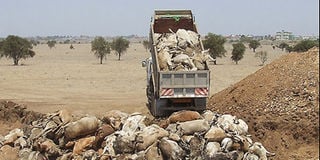Ministry stops buying cattle

A truck offloads dead cows for burial in Athi River. Hundreds of cows have died at the Kenya Meat Commission while awaiting slaughter. Photo/ABEL MOSINGISI
The Kenya Meat Commission (KMC) has suspended the off-take scheme aimed at buying cattle and slaughtering them at the buying centres after the ministry of Livestock Development ran out of cash. The minister, Dr Mohammed Kuti, confirmed the suspension of the programme, saying the Treasury was yet to release Sh200 million to finance it.
He also disclosed that the slaughter of animals at the point of purchase had also been suspended until further notice. The suspension of the two programmes comes amid accusations from livestock owners that the scheme had been hijacked by middlemen who were exploiting them by buying their animals for as little as Sh500 while they sold the same for Sh8,000 to KMC.
The Permanent secretary in the ministry, Kenneth Lusaka, spent the better part of last week shuttling between Kilimo House and Treasury in a bid to unlock the Sh200 million. By Friday evening, the money was yet to be released.
While Mr Lusaka maintained that the offtake scheme was still on but was being staggered to decongest the holding ground in Athi River, the minister said the exercise was facing financial hiccups. “Buying has been stopped, and the ministry is awaiting funds from the Treasury,” Dr Kuti said.
The scheme, which was launched last month to support livestock farmers who were losing their animals due to the prolonged drought, ran into logistical problems after an estimated 600 cattle died at the KMC holding ground in Athi River.
The deaths were blamed on the long trek the cattle had made and and the lack of food at the holding ground. KMC chairman Abdi Aden said the number of animals delivered after it sent out four teams to buy cattle from farmers was overwhelming.
When the offtake scheme was launched, the government intended to buy cattle from farmers, slaughter at least 10 per cent of them at the point of purchase and distribute the meat as relief food to local residents. However, the scheme ran into problems when the animals died in their hundreds as they awaited slaughter at KMC in Athi River.
This was despite a Sh98 million grant from the government to KMC meant for equipment repairs. The commission had reported frequent slaughterhouse breakdowns. Dr Kuti said KMC had been instructed to stop transporting cattle to Athi River to prevent the disaster witnessed at the firm last month.
He assured Kenyans that meat from KMC was safe as the animals were thoroughly inspected before they were slaughtered. The minister said meat from cattle slaughtered at buying points is distributed to local residents and does not find its way to KMC.
“The meat is given to the local communities as relief food,” Dr Kuti said in response to queries about the safety of meat from cattle slaughtered at the purchasing centres. He said the District Steering Group that is made up of local leaders and veterinary officers was mandated to ensure only inspected animals were slaughtered.
But while the minister defended the purchasing system, claims abound of how officials from the ministry are manipulating the system to fleece wananchi and the government of millions of shillings through crooked purchase schemes. According to reports from the field, the officers had empowered middlemen who buy cattle from farmers at a throwaway price before selling the same to KMC for Sh8,000 each.




